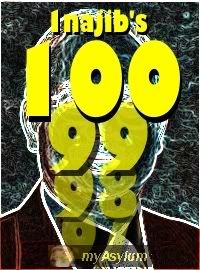1Najib's Hundred
Technorati tags: Politics, Najib's First One Hundred Days, 1Malaysia, 1BlackMalaysia
Walski's post tardiness forenote: As has been the case lately, caused by Walski’s failure to synthesize more time in a day than the standard 24 hours, this post has been wallowing in draft for the past 5 days. He apologizes if some of the stuff here seems dated. In the bloggerhood, anything more than an hour old seems stale…

One hundred days – many consider this a landmark, of sorts. It’s a popular remembrance point for the deceased in many cultures and religions, for instance. In politics, it is also a benchmark to rate persons in office, particularly in the US. Barrack Obama’s first 100 days, for example, was reported on the world over, by all and sundry.
On a slightly smaller scale, and closer to home, Najib’s just had his first hundred yesterday, Saturday July 11th.
The reality of it is that Najib only officially started becoming PM in March this year. His tenure unofficially started a lot earlier, a view articulated by former Finance Minister Tengku Razaleigh Hamzah (via The Malaysian Insider), and one which Walski happens to agree with. This is because unlike his predecessors, Najib transitioned into his premiership without a general election. His is actually the mandate given to Abdullah Ahmad Badawi’s March 8, 2008 election bid.
In the big picture, furthermore, the first 100 days doesn’t really count for much, except for giving us an indication of how the rest of his tenure as Prime Minister may be. But since Malaysian politics can be very unpredictable, the first 100 days are rough indicators, at best. Very rough, in fact.
And since every other netizen seems to be wanting to comment, Walski, too will look at 1Najib’s first hundred.
In a nutshell, it’s been a hundred days of mixed signals, to put it mildly.
(Walski’s selective ratings, and more, in the full post)
Walski’s assessment is in no way comprehensive. He’ll be the first to admit this. But it does cover areas that Walski feels are important, both to him, and to the nation at large. As with any hundred-day report card, we can classify Najib’s performance as either good, bad, or so-so, in the various categories Walski has chosen to look at.
Political Integrity  Now this is a kind of hot potato, from Walski's perspective, because it all depends on from which point you want to keep score from. The Perak Fiasco, for which Najib is clearly the mastermind, happened before our current PM’s inauguration.
Now this is a kind of hot potato, from Walski's perspective, because it all depends on from which point you want to keep score from. The Perak Fiasco, for which Najib is clearly the mastermind, happened before our current PM’s inauguration.
Similarly with the current most talked about fiasco – the Port Klang Free Zone mismanagement. So to be fair, you can’t really blame the guy.
However, looking at his cabinet, and the statements and policy positions that have emanated, Walski is unimpressed, at best. Worst case, Walski is rather worried. But one thing clear is that very rarely does Najib butt in when his ministers make not-so-intelligent remarks (and there have been quite a few).
But it does seem like Najib’s making some headway in the political acceptance department, evidenced by the jump in his approval rating, from 45% to 65%, according to the Merdeka Center’s latest survey (via The Malaysian Insider), and by the Manik Urai by-election last Tuesday, where PAS managed to retain the seat, but by a measly 65 votes, which some are calling a moral victory for UMNO.
Walski thinks that the victory, in a big way, has to do with the so-called Unity Talks that UMNO (especially their grassroots) is still aggressively pushing for, and factions within PAS taking the bait. Believe you Walski, the Unity Talks will benefit one, and only one, party – UMNO. PAS will end up looking like another UMNO, except in silly, out-of-season desert garb. And because there is a good part of PAS that can see this, it may very well end up splitting the party in the process.
Or maybe Walski is being over-analytical, and BN’s promise of a new bridge had something to do with PAS’ sliver slim victory margin. Which, if so, does constitute an election “bribe” in some people’s books. So much for political integrity…
In a nutshell, the best Walski can rate Najib in this department is a resounding so-so. Or 50-50, if you’re more numerically inclined.
Civil Liberties  This is one area Walski can safely say has suffered tremendously since Najib’s come into office. And by civil liberties, Walski includes freedom of assembly (from teargas and water cannons), freedom to wear black, freedom to deliver butter cakes, freedom to light candles, and freedom to use certain words like apartheid (via The Malaysian Insider).
This is one area Walski can safely say has suffered tremendously since Najib’s come into office. And by civil liberties, Walski includes freedom of assembly (from teargas and water cannons), freedom to wear black, freedom to deliver butter cakes, freedom to light candles, and freedom to use certain words like apartheid (via The Malaysian Insider).
Instead, what we’re seeing is arrests for no other apparent reason than because the police feel like it. And then, deny the detainees legal representation.
The most recent seemingly arbitrary arrest of two non-Malay USM students over the weekend for alleged “criminal trespass” onto a “Malay-only area” in UM (via Jelas.info) is not only shocking, it’s disgusting. And yet, Hishamuddin balks when the word apartheid is used?
And Malaysians are still asking the question: why the fuck wasn’t the IPCMC instituted, according to the Royal Commission on Police Misconduct? Instead, a much watered-down Enforcement Agencies Integrity Commission (EAIC) was put into place. Read this post (via Loyar Burok) why the EAIC may actually not be constitutional, while the IPCMC is.
The media, too, is slowly but surely being more muzzled than it has in recent years. One case in point: Florence Looi (of NTV7) being issued a warning letter and an immediate transfer to the station’s news desk (via the Bahasa Malaysia version of Merdeka Reivew). Her crime? For allowing a guest on her Point of View program, The Malaysian Insider’s Leslie Lau, to rate Najib’s first 100 days. It’s no secret that NTV7 is owned by Media Prima (who own ALL the free-to-air stations), and also no big secret that Media Prima is closely linked to UMNO.
Similarly, Media Prima earlier this year (according to Malaysiakini) issued a directive to all 4 of its TV stations to not mention the name Razak Baginda when reporting the Altantuya murder case. Mahathir era self-censorship?
Of course, there are a lot of other examples that Walski has not mentioned. But to put it simply, as far as civil liberties are concerned: FAIL.
Economic Liberalization  If there is one area that Najib has actually been bold enough to reform, it is in the area of the economy, where certain Bumi equity requirements are being eased. Needless to say, this has not been received well by many within his own party, particularly those NEP-is-our-birthright types.
If there is one area that Najib has actually been bold enough to reform, it is in the area of the economy, where certain Bumi equity requirements are being eased. Needless to say, this has not been received well by many within his own party, particularly those NEP-is-our-birthright types.
Blogger Sakmongkol AK47 (who happens to be an UMNO member) provides some interesting insights pertaining to the removal of the 30% equity requirement. In essence, he thinks it’s a good thing. Read what he has to say here.
Here’s the thing – the NEP was formulated in a different era, when the socio-economic strata was very different from what it is today. While the 30% Bumiputra equity ownership requirement was aimed at engineered equitable wealth distribution, it has been abused over the years. Sakmongkol AK47 explains it quite well in his posting, so Walski will not reinvent the wheel.
But Walski’s take on the NEP is this: if it is true that the Malay population are economically the worst off in this country (as claimed by the NEP-is-our-birthright folks), then wouldn’t opening up the NEP to help ALL Malaysians in need cater for the lower economic tier Malays by default? Poverty effects Malaysians of all flavors and colors.
Similarly, if meritocracy is seriously one aspect of 1Malaysia, then let’s make sure it’s emphasized, per the proper definition of the word.
This is one area that Walski gives Najib the thumbs up.
Social Liberalization  In contrast, social liberalization still has a very long way to go. Granted, Najib’s cabinet has tried, somewhat – for instance, in the issue of forced conversion of minors. But then reality sets in.
In contrast, social liberalization still has a very long way to go. Granted, Najib’s cabinet has tried, somewhat – for instance, in the issue of forced conversion of minors. But then reality sets in.
And the reality is that religious conservatism is alive and well in this country. This is one of those other hot potato areas that Walski thinks Najib can do jack about. Conservatism is too well entrenched, no thanks, in part, to the abdication of certain civil rights to the religious conservatives on all sides of the political divide.
It is also no thanks, in part, to the fact that Islam has been politicized. In the war for the Malay Malaysian mindshare, the political “war” between UMNO and PAS has not been without casualty. And that casualty, unfortunately, is some of our fundamental rights.
The key problem is the erosion of mutual respect, cultivated by a very one-sided atmosphere when it comes to religion in Malaysia. By law, other religions are prohibited from proselytizing to Muslims. On the other hand Muslims are allowed (even encouraged) to proselytize to whomever, whenever and wherever they want. It’s not fair, but that’s the law per our Federal Constitution.
Some Muslims, however, translate this to “don’t even fucking let me see a pamphlet of your other religion”. But Muslims can do pretty much whatever they want in the name of spreading or protecting their religion. To the mainstream Muslims in this country, that is fair. Which is probably why white/yellow becomes black, and pedestrian crossings don’t mean a fucking thing in Malaysia. But that’s an entirely other rant that Walski won’t get into.
Suffice it to say, this sense of “fairness” is what’s led to the Al-Islam “investigative journalism” faux pas, which many Muslims (this one, in particular) think is no big deal, but at the same time balk (this one again, in particular) when Christian missionary folks set foot on campuses, even when their purpose there was only to conduct a survey – and end up being detained by campus security.
Walski predicts that any attempt to liberalize society will be met with strong, perhaps even violent, opposition. This is one area that Walski thinks Najib has not succeeded in his first 100 (official) days, nor will he make much headway anytime soon.
Not really Najib’s fault at all, but a thumbs down in this area, since there is not one iota of improvement.
Education  Our education system is another mess that Najib inherits from his predecessors. And the recent decision on the abolishment of PPSMI (Teaching of Maths & Science in English) by 2012 only goes to show that Najib’s administration is only going to make it worse.
Our education system is another mess that Najib inherits from his predecessors. And the recent decision on the abolishment of PPSMI (Teaching of Maths & Science in English) by 2012 only goes to show that Najib’s administration is only going to make it worse.
The abolishment obviously was done for reasons of political appeasement, primarily on the part of the linguistic nationalists. Granted that the program was implemented in a very haphazard and rushed manner – then again, being that Ministry of Education has been a political stepping stone ministry, populist policies (or reversal of policies) are only to be expected. To the detriment of the education system.
One question that’s been raised is this: why is it that the entire damned system has to cater for the weakest students, and not aimed instead at excellence?
National Security  These days, a lot of things are seen to be undermining national security – candlelight vigils, organized kopi-o drink-ins, t-shirts, peaceful protests (by anyone other than those blessed by BN), etc. – a lot of things, other than the feeling of actually being safe.
These days, a lot of things are seen to be undermining national security – candlelight vigils, organized kopi-o drink-ins, t-shirts, peaceful protests (by anyone other than those blessed by BN), etc. – a lot of things, other than the feeling of actually being safe.
Crimes are on the rise, particularly violent ones. And Walski’s not talking about peaceful civil actions that are labeled ‘criminal’ – he’s talking about real crimes, like robbery, murder
~ ~ ~o O o~ ~ ~
There are a lot of other areas that Walski has not covered – he’s decided that if this post were to ever get out, he would have to cut it short. For a more comprehensive look at what some other people are saying about Najib’s first 100 days, here are some resources for you to peruse (which in all likelihood you may already have read):
- Oon Yeoh's in-depth analysis in The Edge (in 8 parts – Part 5 is the latest to be published. Free registration required to access articles at The Edge)
- Rocky Bru’s take on Najib’s 100 Days
- Sakmongkol AK47’s view: The 100 Days Myth
- Aisehman’s KRA-zified analysis
- The mainstream media’s views: Bernama, NST, The Malaysian Mirror, and The Star, among others.
As Prime Minister, Walski thinks that Najib shows promise. Which he’s offered a lot of for a better Malaysia, and it’s left to be seen whether these promises will be delivered as advertised.
And that, folks, is what Walski will be looking out for the next hundred days or so…


![Reblog this post [with Zemanta]](http://img.zemanta.com/reblog_e.png?x-id=13a3406c-2e54-43c0-929b-9d171b898036)














